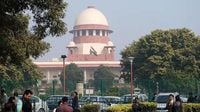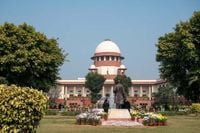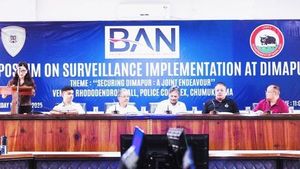The Supreme Court on Thursday, April 17, 2025, extended the services of "untainted" candidates employed as assistant teachers for Classes 9-12 under the West Bengal School Service Commission's (SSC) recruitment process in 2016 until December 31, 2025. This decision comes in light of the state government's request to allow these teachers to continue working while a fresh recruitment process is established.
In a significant ruling, a bench comprising Chief Justice of India Sanjiv Khanna and Justice Sanjay Kumar directed the West Bengal government to complete new recruitments by the end of this year. "We are inclined to accept the prayer in the application in so far as it relates to the assistant teachers for classes 9 to 12, subject to the following conditions. Advertisement for fresh recruitment shall be published on or before May 31, 2025. Examinations and the entire recruitment process shall be completed by December 31, 2025," the bench stated.
The court's directive mandates that the state government and the WBSSC submit an affidavit by May 31, 2025, detailing the advertisement and schedule for the recruitment process. Failure to comply with this deadline could result in the court imposing costs or vacating the order.
This ruling follows an earlier decision on April 3, 2025, where the Supreme Court upheld a Calcutta High Court order that invalidated the appointments of over 25,000 teachers and non-teaching staff recruited through the 2016 WBSSC examinations. The court described the entire selection process as "tainted beyond resolution," necessitating a complete overhaul of the recruitment procedure.
The state government had argued that the terminations of these teachers had negatively impacted the quality of education in various state-run and aided schools. During the hearing, Chief Justice Khanna expressed concern for the students affected by these decisions. "We are concerned about the students, and therefore we permit them. But you have to give an undertaking that an advertisement will be out by May 31 and if not, we will recall," he emphasized.
Senior Advocate Jaideep Gupta, representing the state government, assured the court that the advertisement would be published by the stipulated date. He outlined a multi-step recruitment process, stating, "First step is that the state formulates rules. The next step is the advertisement. There will be four advertisements for different categories. And then there will be the exams."
Senior Advocate Kapil Sibal also appeared for the state government, reinforcing the commitment to completing the recruitment process by December. Meanwhile, Senior Advocate N K Kaul, representing the WBSSC, highlighted the staffing crisis resulting from the ongoing litigation, noting, "Since 2016, there has been no recruitment because of this litigation, so they are understaffed."
The Supreme Court's decision to extend the services of these "untainted" teachers is intended to mitigate the immediate impact of the recruitment freeze while ensuring that a new, fair selection process is implemented. However, this extension does not apply to Grade C and D employees, as the court seeks to focus on the more critical teacher positions.
The case's origins lie in the 2016 recruitment process, which has been marred by allegations of irregularities. This has led to widespread scrutiny of the WBSSC and its hiring practices, prompting calls for a transparent and accountable recruitment framework moving forward.
The court's ruling is a pivotal moment for the education sector in West Bengal, as it aims to restore trust in the recruitment process and ensure that qualified individuals are placed in teaching positions. The urgency of the situation is underscored by the need to address the educational needs of students across the state, many of whom have been affected by the ongoing uncertainty surrounding teacher appointments.
As the state government gears up to meet the court's deadlines, the focus will be on ensuring that the new recruitment process is not only timely but also equitable. This includes establishing clear guidelines and standards for selection, thereby preventing the issues that plagued the previous recruitment cycle.
In conclusion, the Supreme Court's intervention highlights the importance of a fair educational system and the need for accountability in recruitment processes. With the deadline set for May 31, 2025, all eyes will be on the West Bengal government and the WBSSC as they work to navigate this complex landscape and fulfill their obligations to the state’s students and educators.





